37 questions for 2025 and beyond
The Ipsos Consumer Tracker asks Americans questions about culture, the economy and the forces that shape our lives. Here's one thing we learned this week.
Why we asked: This was the biggest election year in human history. Globally, there wasn’t a clear trend in the results. Some nations shifted conservative. Some shifted liberal. At home, depending on who won the nailbiter of a U.S. presidential election, two very different futures were plausible. We’ve been saying all year that planning for both of those futures was important. Now, we have the results. So what’s next?
We took statements from the campaign, the Project 2025 document, Trump’s Agenda 47, and statements from cabinet nominees and tried to game out some of the top priorities for the incoming administration. We thought we would set a “before” benchmark across seven policy areas during the time between the election and inauguration. Where possible, we trended statements Ipsos has asked before in various contexts. Those won’t always be perfect comparisons, as we’ll note. Of course, as a Consumer Tracker, we will track these points moving forward.
What we found: [Note, as a shorthand, we’ll note the difference between parties like this: (D +32), meaning 32 percentage points more Democrats agreed than Republicans, but if we also give the total, (65%, D +16) we mean that the split is 16 points, not that D is 81%. We’re trying to show the difference to give you a sense of how far apart the two sides are. See the charts for details.]
TL:DR: The stated early policy priorities of the Trump administration aren’t always popular and are often deeply polarizing. With the slimmest of House majorities, it will be interesting to see becomes law and what doesn’t. But regardless, a lot of Americans are likely to be unhappy and a lot of Americans are likely to be really excited. As campaign pledges become proposals, become laws, and begin shaping our nation’s future it will be imperative to keep a stoic eye on shifts and signals about how people are responding – especially on the issues that affect their wallets.
Now for some detail: Several of our most polarized opinions relate to immigration, so let’s start there. Trump has promised that mass deportations will begin on day one of his second term. One in four Americans say they know someone who is worried about being deported. That’s the statement we most agree on regarding immigration today and it will be interesting to see how that shifts as the scope and timing of his plans become reality. Republicans are much more likely to see negatives when it comes to immigration: that relaxed immigration leads to higher housing costs, that it has placed too much pressure on public services and that the U.S. would be stronger, and job prospects will improve if we stopped immigration. Democrats are much more likely to say that stopping immigration will cause labor shortages.
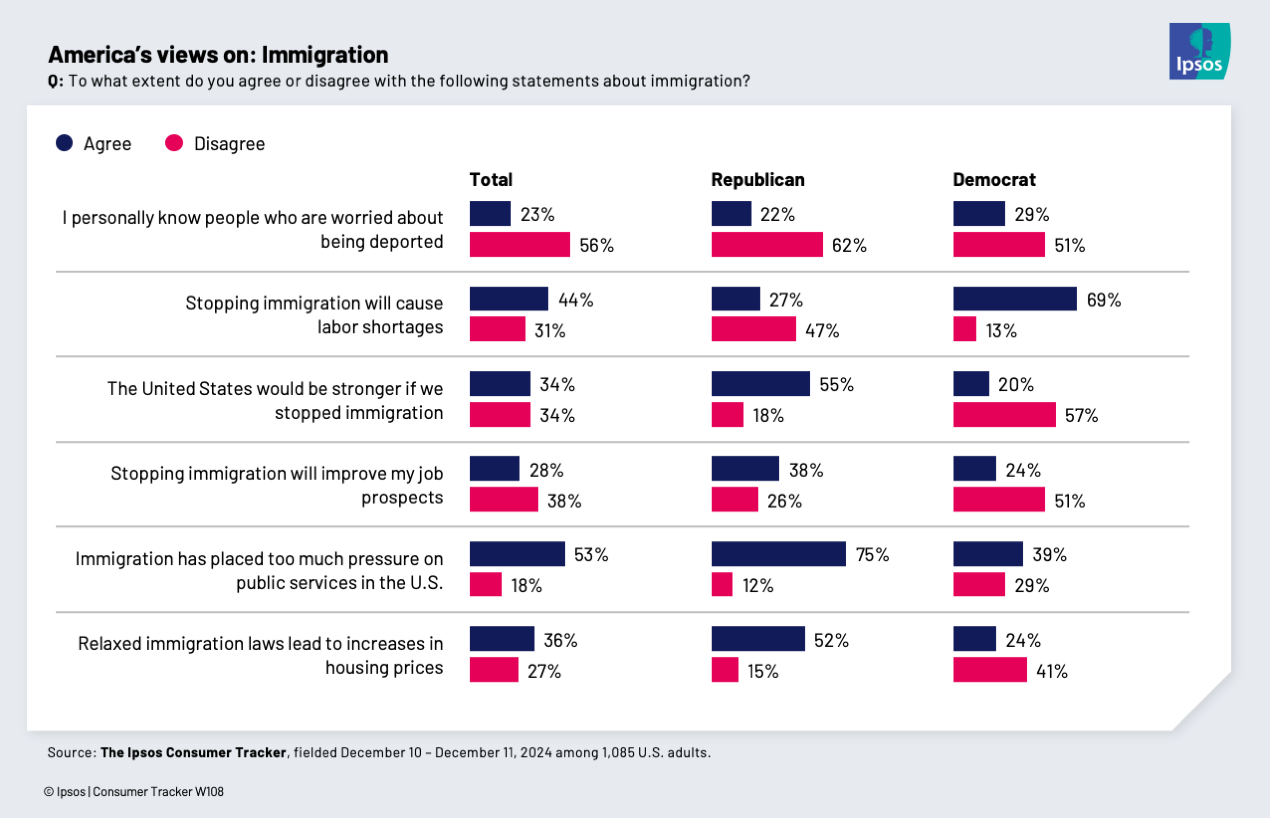
Somewhat related, America’s place in the world was also deeply polarizing. About half see NATO as a force for good in the world (D +32) and while a majority agree that it’s important for the U.S. to play an active part in world affairs, a larger majority (63%, R+25) say that given the difficult economy in the U.S., the nation needs to focus on domestic issues. There is bipartisan agreement, however, that the news media in the U.S. should continue to be protected under the First Amendment (65%, D +16). Incidentally, pornography (another First Amendment target of Project 2025) saw less support for continued First Amendment protections with only 38% supporting (D +11, but still not a majority).
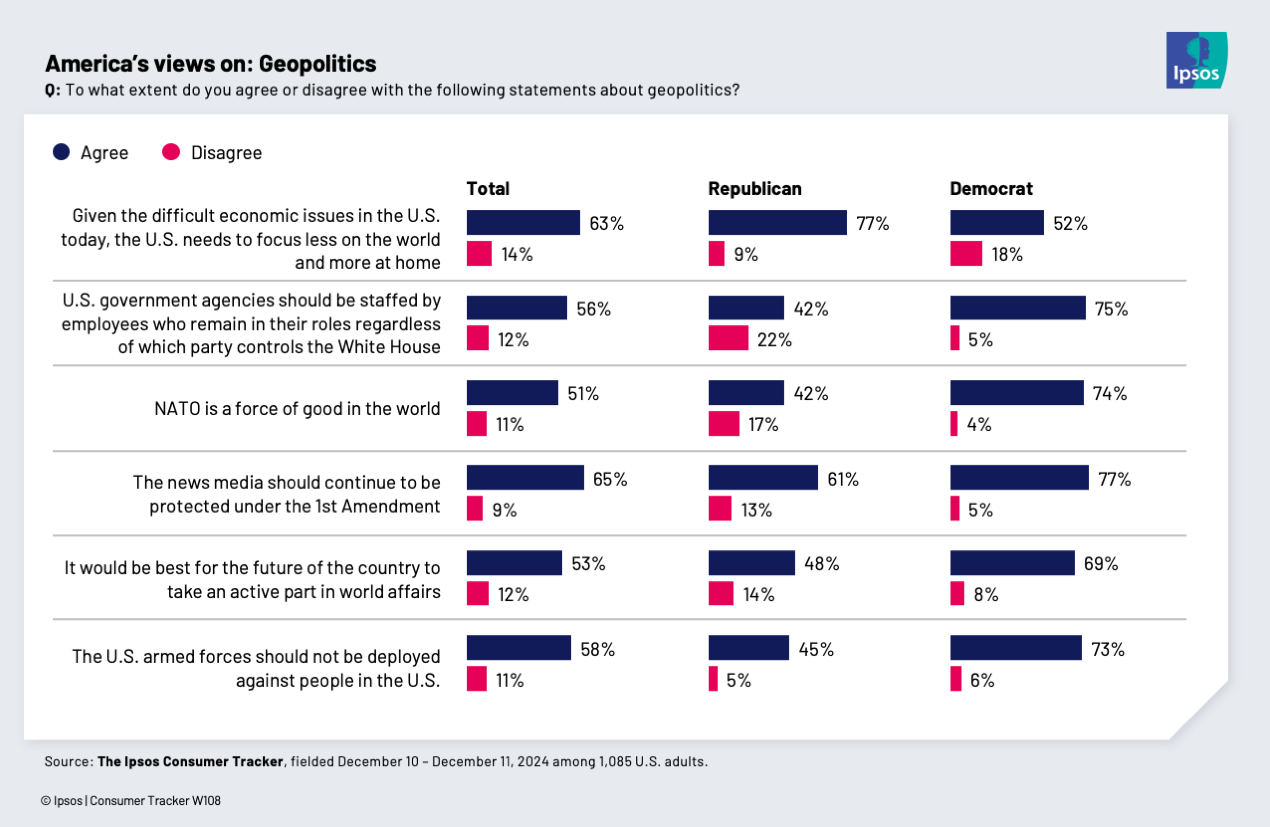
One interesting stat is that only 39% of Americans think electric vehicles are better for the environment than their gas-powered counterparts (D +29). This is likely due to a series of mostly debunked stories, likely aimed at dissuading liberals from buying EVs. Those articles suggest that lithium batteries are worse for the environment than fossil fuels. And sure, lithium mining practices are not great, and lithium isn’t the be-all-end-all, but fossil fuels are much worse for the environment. This will be a super interesting one to watch, especially as a deeply political majority (58% D +37) thinks the government should continue setting policy that reduces carbon emissions from fuel. Those polices (such as the “CAFE” fuel emissions goals) are one policy the new administration can quickly alter without congressional action. All of this has broad implications for policy and corporate leaders as well as consumers and, well, people who live on a rapidly warming Earth.
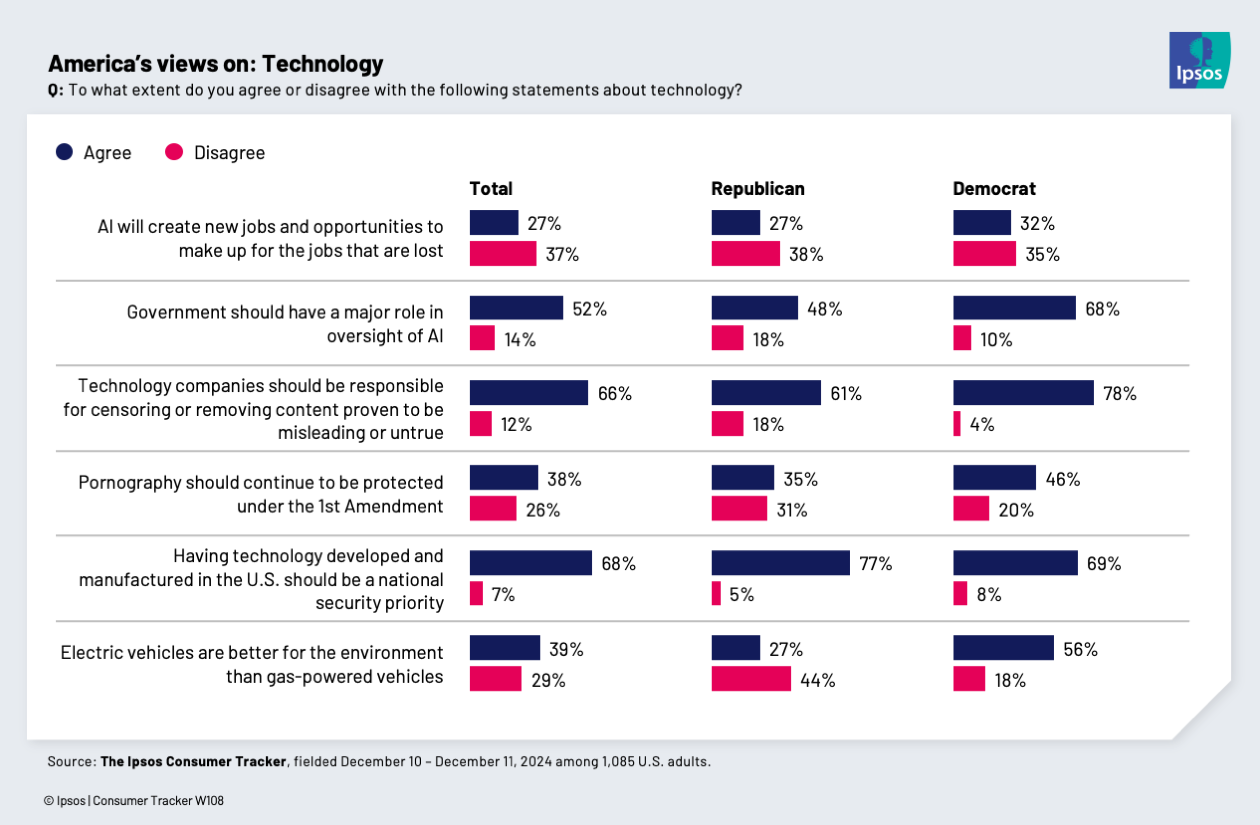
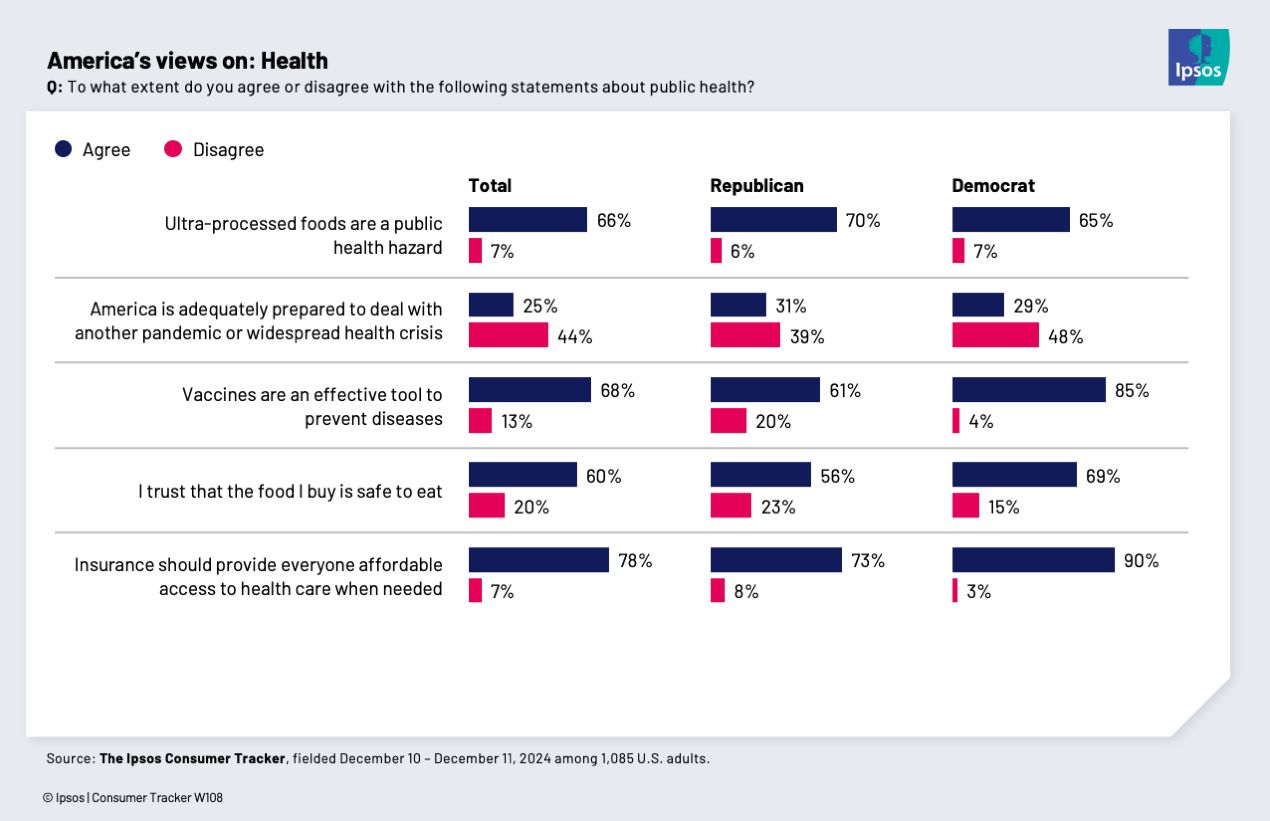
Another important call-out for brands is that four in ten (D +36) say they are more likely to purchase from a company that has taken a public stance against racism. Despite a lot of campaign rhetoric, very public “anti-woke” boycotts and high-profile DEI rollbacks, this stat hasn’t changed since we last asked a year ago. Even the party splits are consistent.
Out of 37 statements, 13 enjoy bipartisan support and 8 see bipartisan disagreement. The ideas we agree on refer to things that are considered quintessential American values, like home ownership is part of the American dream, or education is the great equalizer and protecting journalism. Others relate to the idea that government needs to have a role in supporting those values by actively keeping mortgage rates low, or making college more affordable for students and graduates and helping fund schools in low-income areas essentially to keep education an equalizer. People of both parties also agree that companies have a role in protecting our values, too. Americans think insurers should provide everyone with affordable healthcare and tech companies should remove misleading and untrue content from their platforms. Technology is so important, Americans feel, that it should be developed or manufactured in the U.S. as a matter of national security.
Americans also agree on three things related to public health which will be especially interesting to watch under Health and Human Services nominee Robert F. Kennedy, Jr. Americans of both parties think that vaccines are an effective tool to prevent diseases, that the food they buy is safe to eat, and that ultra-processed foods are a public health hazard.
A majority also agree with a couple of statements that reflect long-standing but not necessarily fully-codified American precedents. One, that the U.S. military shouldn’t be deployed against people in the U.S. (53% D +28). Quelling riots, etc., has been the purview of the National Guard, which is governed by states, as opposed to the U.S. Army or U.S. Marines. Second is the idea that government agencies should be staffed by experts in their field with often long-standing experience running important functions like the defense of our nation, the Census, Medicare, the IRS, keeping the nuclear arsenal safe and functional, etc. You know, the day-to-day running of the largest employer in the U.S. This has generally always been how the government worked, and only the oversight of those agencies and key rolls within them are staffed by political appointees. A majority thinks it should stay that way, but it’s one of the most polarized statements (53% D+33). This is a big focus of the incoming administration, which is talking about replacing a much larger part of the federal workforce than is typical with workers who are ideologically aligned.
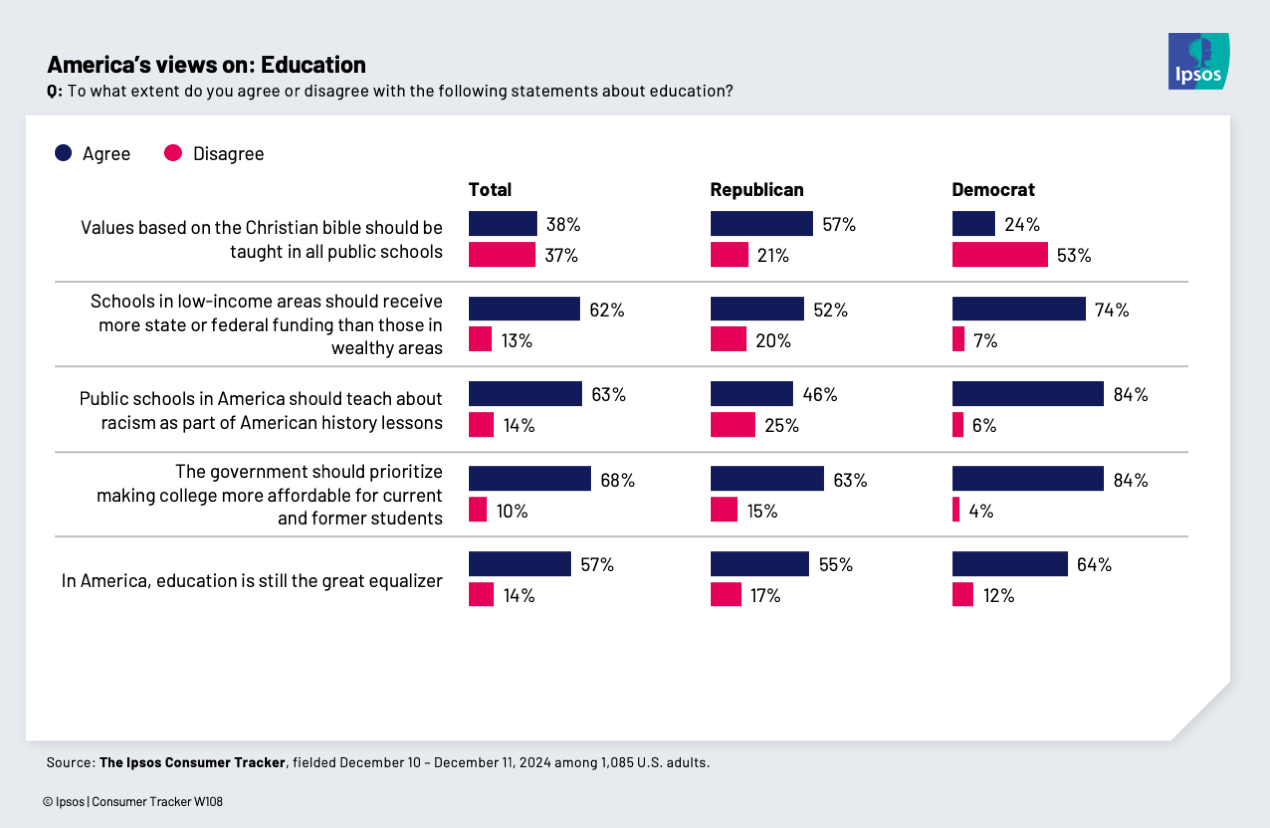
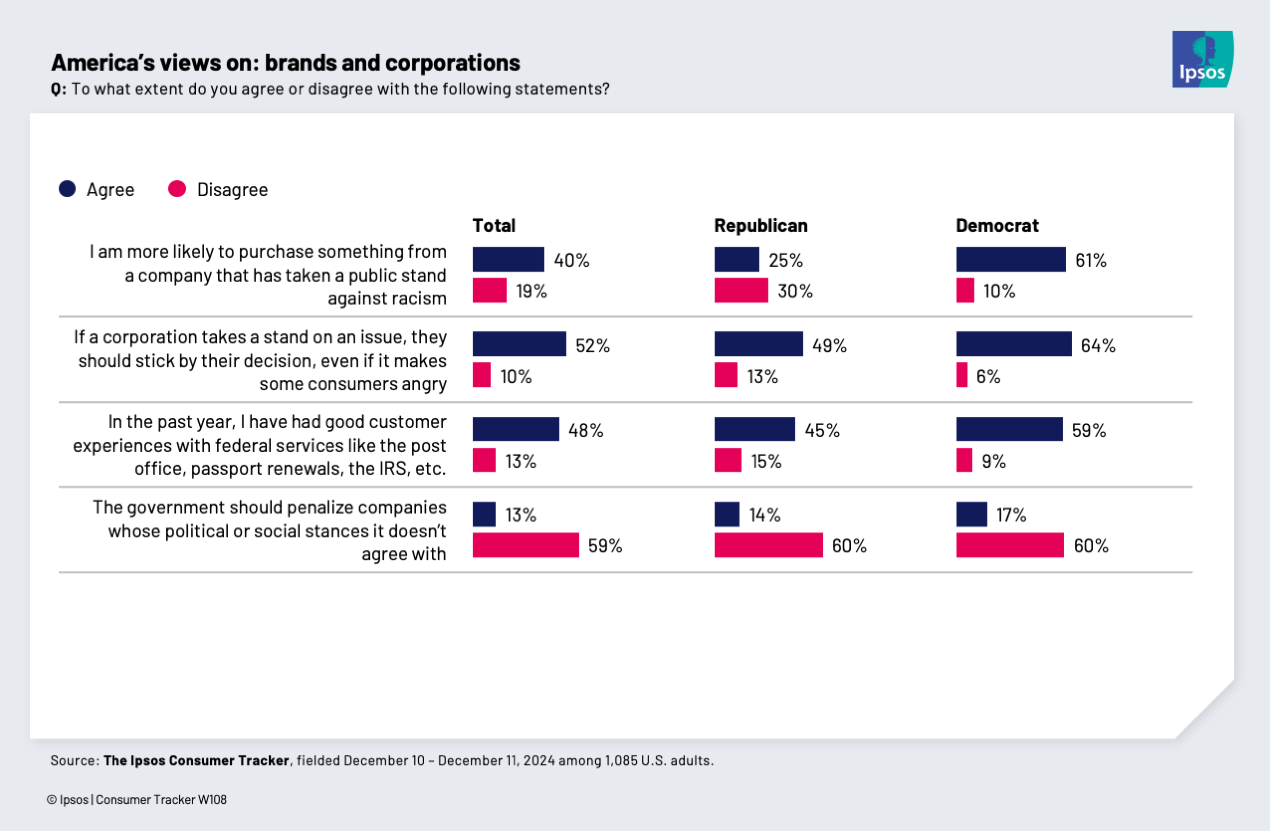
The statement fewest Americans (13%) agree on is that the government should penalize companies whose political or social stances it doesn’t agree with. Few think cryptocurrency is a safe investment (18% R+7). Only one in four think AI will create more jobs than it replaces.
And finally, while not quite a majority, more than four in ten in each part say that after paying their monthly bills they don’t have any money left over to spend on the things they want. That number is much lower than the height of the post-pandemic inflation rush, but hasn’t changed since May, despite a strong economy.
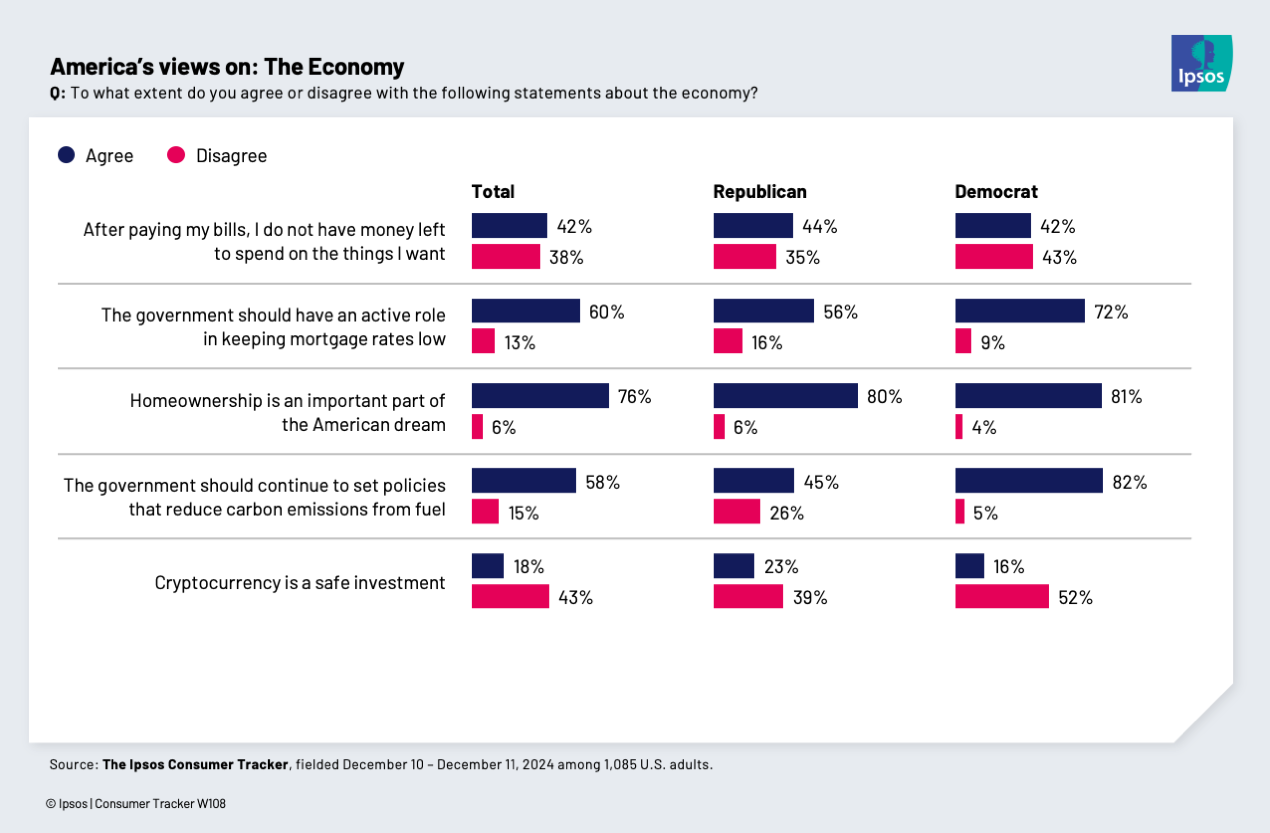
Arguably, that last stat is the one that matters most. This election once again showed that it’s (perceptions of) the economy that matter most. As we’ve written in the Dispatch before, it’s not just the economy. It’s the parts of the economy that impact people directly (inflation and cost of living), which aren’t always the parts that corporate leaders, economists and policy makers focus on (GDP, unemployment).
Next up: Keep an eye out for our post-election POV in January, which will take a look at these issues through the lens of Ipsos Global Trends and provide sector-specific outlooks and take-aways.
More insights from this wave of the Ipsos Consumer Tracker:
The holidays are making us happy, joyful and stressed
Most people don’t know how tariffs work (and some even admit that)
Most think tariffs will increase prices, but aren’t doing anything about it



